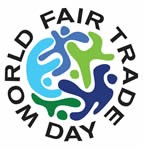Held on : 14th May
 According to World Fair Trade Day Organisation - Fair Trade is a trading partnership, based on dialogue, transparency and respect, that seeks greater equity in international trade. It contributes to sustainable development by offering better trading conditions to, and securing the rights of, marginalized producers and workers – especially in the South. Poverty and hardship limit people's choices while market forces tend to further marginalise and exclude them. This makes them vulnerable to exploitation, whether as farmers and artisans in family-based production units (hereafter "producers") or as hired workers (hereafter "workers") within larger businesses. Fair Trade aims to be consistent at the level of principles and values but flexible at the level of implementation and this presents challenges in defining the concept in practical and concrete processes that can be applied universally. World Fair Trade Day (WFTDay) is an initiative of the World Fair Trade Organization (WFTO, www.wfto.com) and is being supported by thousands of citizens, Fair Trade Organizations, social and environmental movements, producers and consumers all around the planet. Local authorities, national governments and multilateral institutions have been supporting Fair Trade for several decades now.
According to World Fair Trade Day Organisation - Fair Trade is a trading partnership, based on dialogue, transparency and respect, that seeks greater equity in international trade. It contributes to sustainable development by offering better trading conditions to, and securing the rights of, marginalized producers and workers – especially in the South. Poverty and hardship limit people's choices while market forces tend to further marginalise and exclude them. This makes them vulnerable to exploitation, whether as farmers and artisans in family-based production units (hereafter "producers") or as hired workers (hereafter "workers") within larger businesses. Fair Trade aims to be consistent at the level of principles and values but flexible at the level of implementation and this presents challenges in defining the concept in practical and concrete processes that can be applied universally. World Fair Trade Day (WFTDay) is an initiative of the World Fair Trade Organization (WFTO, www.wfto.com) and is being supported by thousands of citizens, Fair Trade Organizations, social and environmental movements, producers and consumers all around the planet. Local authorities, national governments and multilateral institutions have been supporting Fair Trade for several decades now.
History
Fair trade was first established in the United States, where Ten Thousand Villages (formerly Self Help Crafts) began buying needlework from Puerto Rico in 1946, and SERRV began to trade with poor communities in the South in the late 1940s. The first formal “Fair Trade” shop which sold these and other items opened in 1958 in the USA. The Trade spread and was first held at held in Europe during the late 1950s when Oxfam UK started to sell crafts made by Chinese refugees in Oxfam shops. In 1964 it created the first Fair Trade Organization. Parallel initiatives were taking place in the Netherlands and in 1967 the importing organization, Fair Trade Original, was established. At the same time, Dutch third world groups began to sell cane sugar with the message “by buying cane sugar you give people in poor countries a place in the sun of prosperity”. These groups went on to sell handicrafts from the South, and in 1969 the first “Third World Shop” opened. World Shops, or Fair Trade shops as they are called in other parts in the world, have played (and still play) a crucial role in the Fair Trade movement. They constitute not only points of sales but are also very active in campaigning and awareness-raising.
During the 1960s and 1970s, Non-Governmental Organizations (NGOs) and socially motivated individuals in many countries in Asia, Africa and Latin America perceived the need for fair marketing organizations which would provide advice, assistance and support to disadvantaged producers. Many such Southern Fair Trade Organizations were established, and links were made with the new organizations in the North. These relationships were based on partnership, dialogue, transparency and respect. The goal was greater equity in international trade. In 1998 World Fair Trade Day Organisation was formed. The World Fair Trade Organization (WFTO) is the global representative body of over 350 organisations committed to 100% Fair Trade. The WFTO is the authentic voice of Fair Trade and a guardian of Fair Trade values. The WFTO operates in 70 countries across 5 regions; Africa, Asia, Europe, Latin America, and North American and the Pacific Rim, with elected global and regional boards, to create market access through policy, advocacy, campaigning, marketing and monitoring. Similar Organisation were being formed all over the world. They united and brought the Fair Trade Movement to a worldwide level. The first World Fair Trade Day, which involves the worldwide Fair Trade movement, was celebrated on May 4, 2002. Since then, World Fair Trade Day has been held each year on the Second Saturday of May.
Events
These include:
- Public Fairs promoting Fair Trade products are held.
- Various Art Shows are held which help to learn about the environment, poverty and women's issues.
- Films and Documentaries highlighting Fair Trade Themes such as poverty and the food and water crisis are organized in schools and local communities.
- Promotion of Fair Trade coffee and beverages in offices and participating coffee shops.
- Educational Institutes organize Fair Trade lectures to encourage student participation and highlight Fair Trade.
- Concerts are also organized by local communities to promote Fair Trade awareness.
- Fair Trade products are used in cooking competitions to promote Fair Trade and discover Fair Trade menus worldwide.
Themes
Previous year's Themes:
- 2004 (May 8) - Small Change, Big Difference.
- 2005 (May 14) - Fair Trade is Peace.
- 2006 (May 13) - Fair Trade Organizations NOW!"
- 2007 (May 12) - Kids and Fair Trade.
- 2008 (May 10) - Fair Trade + Ecology.
- 2009 (May 9) - BIG BANG!! Beat poverty - Beat climate change - Beat the financial crisis.
Holiday Status - It is not a Holiday.
